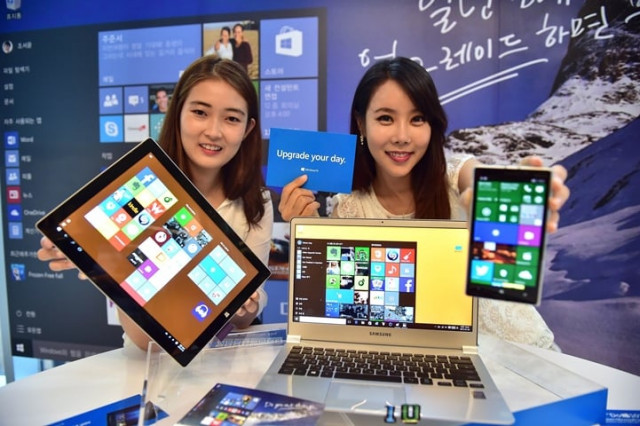Microsoft rolls out Windows 10 in a bid to revive growth
'Our vision was one platform, one store, and one experience that extends across the broadest range of devices'

A launch event in Seoul for Windows 10, the latest operating system from US software giant Microsoft, on July 29, 2015. PHOTO: AFP
The stakes are high for Microsoft as it pushes out the new operating system for both traditional computers and mobile devices such as tablets and smartphones.
The US tech giant is hoping the new system can help it gain traction in mobile, where it lags behind Google Android and Apple iOS.
 Visitors try out Windows 10, the latest operating system from US software giant Microsoft, during a launch event in Seoul on July 29, 2015. PHOTO: AFP
Visitors try out Windows 10, the latest operating system from US software giant Microsoft, during a launch event in Seoul on July 29, 2015. PHOTO: AFP"Our vision was one platform, one store, and one experience that extends across the broadest range of devices from the smallest screens to the largest screens to no screens at all," said Microsoft executive vice president for Windows Terry Myerson in a blog post.
"Windows 10 begins to deliver on our vision for more personal computing. In this world experiences are mobile, moving with you seamlessly and easily across your devices. Interacting with technology is as natural as interacting with people -- using voice, pen, gestures and even gaze for the right interaction, in the right way, at the right time. And in our connected and transparent world, we respect your privacy and help protect your information."
Read: Microsoft aims to reboot relations with Windows 10
Forrester Research analyst Frank Gillett said Microsoft faces a tough task in catching up with Google and Apple in the mobile space.
"Microsoft will face a long road ahead to gain Windows share in mobile," he said. "While it will win a growing share of enterprise tablet purchases, the plans for Windows 10 don't show enough potential to create a differentiated mobile experience that will draw developers and customers away from iOS and Android."
Richard Edwards, analyst at the consultancy Ovum, said Microsoft is looking beyond mobile to emerging technologies including wearables and other connected devices.
Read: Nokia unveils virtual reality camera for filmmakers
"This isn't about recapturing the important mobile operating systems market," Edwards said. "It's about gaining a strong foothold in the next multibillion dollar market: the 'Internet of Things.'"
Windows 10 -- Microsoft skipped directly from Windows 8, which got a lackluster response -- is being offered as a free upgrade for most devices, making it possible to be available quickly on billions of devices.
It will allow for voice, pen and gesture input, and in some cases biometric identification for improved security. The Cortana virtual assistant -- Microsoft's answer to Apple's Siri and Google Now -- will also be integrated.
And Windows 10 will include the Microsoft Edge browser, a move designed to help the tech giant regain market share lost to rivals such as Mozilla Firefox and Google Chrome.
Microsoft hopes to break the cycle in which consumers shun Windows for mobile because it lacks the large catalog of applications found on rival platforms, thus discouraging app makers from creating Windows versions.
Read: Microsoft to launch Windows 10 on July 29
Hit apps could ramp up popularity of Windows-driven hardware made by Microsoft and its partners, and increase opportunities for the company to make money from online activities such as search, shopping and software as services in the Internet cloud.
With Windows 10 and other products, Microsoft is shifting away from one-time software sales to a subscription model -- or software as a service -- in an effort to better compete in the new tech landscape.
Bob O'Donnell at the research firm Technalysis said the new operating system may help stimulate new sales of computers and other hardware -- a phenomenon of the past which has been absent in recent Windows releases.
"I'm still hopeful that the PC industry will see some decent upside from Windows 10, particularly in the fourth quarter of this year and into 2016," he said.
"The primary reason for my optimism is that Microsoft has actually integrated quite a few new capabilities into Windows 10 that will benefit from new hardware."



















COMMENTS
Comments are moderated and generally will be posted if they are on-topic and not abusive.
For more information, please see our Comments FAQ